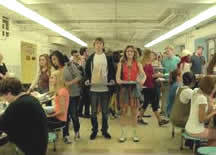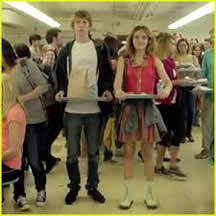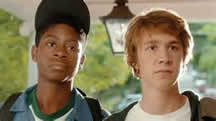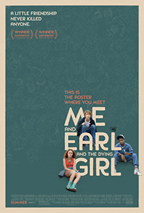 "You know, for a kid like me, in high school, the best case scenario is, just, survive. You know, survive -- without creating any mortal enemies, and without hideously embarrassing myself forever."
"You know, for a kid like me, in high school, the best case scenario is, just, survive. You know, survive -- without creating any mortal enemies, and without hideously embarrassing myself forever."
This is the game plan of Greg Gaines, the "terminally awkward" eighteen-year-old who has "carefully cultivated invisibility" as a way of navigating the cliques and ostracisms, rivalries and betrayals of what he sees as his high school's league of nations -- and its very particular self-selecting apartheid.
Surviving high school
By his senior year, the gangly Greg -- with his big nose, sunken chin, pasty complexion, and shaggy hair -- has become fully conversant with the languages and customs of his high school's various sovereign states: the head nods of Jock Nation, the fist bumps of the Kingdom of Stoners, the innocuous witticisms of the People's Republic of the Theater Dorks...
To provide himself a modicum of security -- survivability -- Greg has acquired quasi-citizenship in every nation, providing him with a passport to a range of otherwise off-limits high-school realms, and a relatively safe-passage visa through the otherwise treacherous socially-booby-trapped hallways.
His strategy: Be on low-key low-profile good terms with everyone.
High-school constituencies and affinities  The "everyone" in Jesse Andrews' Young Adult novel includes the rich kids (who have their well-guarded in-school "gated community"); the smart kids (who are mocked for knowing how an adverb works); the church kids; the theater kids (with their dog-eared The Wiz songbooks); the gang-bangers (who are rarely on the premises); the band kids; and the gothy dorks (taken with elves and centaurs, and the Magic card opportunities to jab dragons and hordes of the undead "with swords, under the eerie light of like eight different moons").
The "everyone" in Jesse Andrews' Young Adult novel includes the rich kids (who have their well-guarded in-school "gated community"); the smart kids (who are mocked for knowing how an adverb works); the church kids; the theater kids (with their dog-eared The Wiz songbooks); the gang-bangers (who are rarely on the premises); the band kids; and the gothy dorks (taken with elves and centaurs, and the Magic card opportunities to jab dragons and hordes of the undead "with swords, under the eerie light of like eight different moons").
Greg's innocuous infiltration into those domains is accomplished by casually interacting with (maintaining non-committal relationships with) each nation, once in a while, in a way that is invisible to those of other nations. He never commits to an interaction that isn't casual or mellow.
School lunchrooms, boundaries and bailiwicks
From the YA novel, we learn that the lunchroom is where students may be asked (or feel obliged) to demonstrate their "allegiance to one group or another by sitting with them, for all to see."
There are distinct geographies in high school: Greg has surveyed the colonies and their borders; has identified the various security councils; and scoped out the refugees and nomads.
To remain a resolutely-unaligned nation-of-one, Greg takes evasive action: He scrupulously avoids "being asked to sit with some poor sap who's not even in a group." In the YA novel, Greg explains, "Pity them, yes; befriend them, never. To befriend them is to share their fate."
Greg has mastered the art of disengagement and the science of bailing out.
This strategy allows him to survive the school cafeteria where "every inch is disputed territory," which, he explains, is the Crimea, Kashmir, the Gaza Strip, and Kandahar all rolled into one. He adds that the lunchroom is partitioned into what could be thought of as off-limits ominously-mined harbors. He thinks of the cafeteria as a seascape, and his navigations bespeak a kind of wary seamanship: The lunchroom is "the Indian Ocean with pirates -- Captain Phillips pirates, not Pirates of the Caribbean. Although, actually, who knows? Maybe both."
An adult-award outcast?
Maybe those who vote for Golden Globes, SAG awards, and Oscars are far removed from those conflict zones. But the descriptions ring true for anyone who has worked as a substitute teacher (and pulled lunch-room duty) in a high school. And the descriptions ring true for thousands of teenagers who have read Jesse Andrews' novel, which was the basis for Andrews' screenplay -- which should have been nominated for best adapted screenplay.
But it wasn't. Why? Because Greg and his "co-worker" Earl parody revered cinema? Story-telling graphics accompany their movie titles, which traffic in bad puns and other wordplays: Senior Citizen Cane, The 400 Bros, The Seven Seals, The Rad Shoes, Vere'd He Go?, Scabface, A Sockwork Orange, A Box o' 'lips wow, Rosemary's Baby Carrots, Anatomy of a Burger, The Turd Man, 2:48 Cowboy, Death in Tennis...
The Greg Gaines/Earl Jackson Filmography
These titles delight the silly side as one registers the film's scans of the artwork for Greg and Earl's DVDs. There's a more expansive list of titles in the frames following the closing credits, including Gone with My Wind and The Prunes of Wrath. A turnoff for serious cinema types?
Appended to the film's production notes is the "Complete" filmography, which includes Brew Velvet -- the exotic beverage that induces allegorical dreams. Instead of Mean Streets, there's Grumpy Cul-de-Sacs. There are admittedly juvenile homages: to Fellini, Ate ½ (of my lunch) ; to Ang Lee, Crouching Housecat, Hidden Housecat; to Steven Spielberg, Gross Encounters of the Turd Kind; to Martin Scorsese, Raging Bullsh*t; and to Alfred Hitchcock, Rear Wind. Still more turnoff?
Likeability
Greg and Earl do not take themselves, or their movies, or their movie-making, seriously. They are the antithesis of the ponderous pretentious analyses about the art and craft of cinema that we endure in the documentary Hitchcock/Truffaut.
For me, Greg and Earl have a lot more to say -- gasp! -- than the schoolkids in Richard Linklater's much-awarded Boyhood. The couple in Linklater's Before Sunrise, Before Sunset, and Before Midnight do so much talking that there's little time, opportunity, or inclination to have other than a contentious relationship.
Jesse Andrews doesn't go for a carnal relationship. Instead, we get friendship. Sundance audiences got it right: Me and Earl and the Dying Girl won the 2015 Audience Award (Drama) and the 2015 Grand Jury Prize (for the film "that comprises the best of both great comedy and drama").
How about the dialogue? There's an authentic sprinkling of "uhs" and "ums" and a key "so, like, uh..." here and there. But there's also offhandedly intelligent teen talk, without the literary and philosophical references John Green engagingly supplied in The Fault in Our Stars. Andrews has Greg explain that his mother is "the LeBron James of nagging." Greg tells Rachel, whose father abandoned her and her mother, that she should apply for "a dad refund."
Oh, almost forgot: Rachel has leukemia; acute myelogenous leukemia. Stage Four, it turns out.
Does a Young Adult story resonate with teens who are dealing with cancer, and with those who care for cancer-ridden teenagers?
Not hokey, not run-of-the-mill
What also endeared the film to me were Greg's asides, explaining that the story he is trying to relate to us is not a typically-touching teenage romance. Thank you, Greg; thank you, Jesse Andrews.
What makes Me and Earl and the Dying Girl distinctive -- and so appealing -- is that it does not have any of the following:
- extraterrestrials
- werewolves
- vampires
- zombies
- dystopian clashes and escapes
- lightsabers
- supersonic bow-and-arrow archery
- car chases
- drag races
- automobile envy and shame
- school parking-lot confrontations
- good girl -- hot girl rivalries
- a vapid hot girl
- football heroes and prom queens
- cheerleaders and cheerleading competitions
- glee clubs and glee-club competitions
- breakdancing and free-styling dance-offs
- no parents-are-away bacchanalian house-parties
Me and Earl and the Dying Girl takes nothing from the world of Hunger Games, Divergent, or Twilight sagas. There's nothing from the James Dean School of angst. And yet Greg and Earl were rebels -- even before they acquired a cause. Their acquired, meaningful, cause: the "doomed friendship" with a dying girl; a friendship that moved from awkwardness and pity to genuine regard and respect, admiration and affection. Heartfelt -- yes, heartfelt.
The Arc of the story
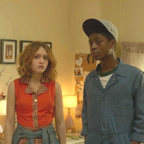 The first hour of the film -- as one would gather from the above accounts and references -- is wryly observant, larky, playfully skewering and irreverent.
The first hour of the film -- as one would gather from the above accounts and references -- is wryly observant, larky, playfully skewering and irreverent.
The next forty minutes are touching, without being corny or sappy, maudlin or mawkish. Good screenwriting. Good dialogue, delivered believably. And the dialogue isn't wordy. There are pauses and silences that seem just right -- real.
Effective, useful story-telling, without melodrama
Regardless of our age, maturity, or high-school experiences, the book and the film get us to think about how we deal with news that is uncomfortable.
What gasps, grimaces, other facial expressions or gestures do we suppress?
What do we say to a person whose life expectancy may not have a long span?
Do we rehearse for such a role?
In the novel, Greg tells us that when he isn't visiting Rachel at the hospital, he feels guilty; when he visits her at the hospital, he feels ineffective and useless. This conflict, this dilemma, is well conveyed in the film.
Award-ceremony competition
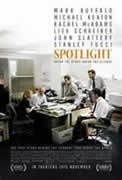 Okay, for sure, unquestionably, Spotlight is a serious and wholly-engaging depiction of serious (enraging) wrongdoing, brought to light by diligent, tenacious research -- truly commendable digging for truth; the best kind of journalistic inquiry and revelation. The unsensational presentation of hard journalistic work and its notable impact warrant accolades. The casting of the victims and their portrayals deserve special mention.
Okay, for sure, unquestionably, Spotlight is a serious and wholly-engaging depiction of serious (enraging) wrongdoing, brought to light by diligent, tenacious research -- truly commendable digging for truth; the best kind of journalistic inquiry and revelation. The unsensational presentation of hard journalistic work and its notable impact warrant accolades. The casting of the victims and their portrayals deserve special mention.
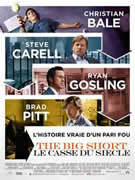 The Screen Actors Guild award for the Outstanding Performance by a Cast in a Motion Picture went to Spotlight. My vote would have been for The Big Short.
The Screen Actors Guild award for the Outstanding Performance by a Cast in a Motion Picture went to Spotlight. My vote would have been for The Big Short.
And I would have listed the cast of Me and Earl and the Dying Girl among those nominees in that SAG category.
As for the Oscar category Best Adapted Screenplay (Best Writing, Screenplay Based on Material Previously Produced or Published), my vote would go to The Big Short.
But I would have included Me and Earl and the Dying Girl among the nominees in that category as well.
So, you wouldn't want to bet any money on my selections. Nope.
The Big Short -- a chronicle of infectious shortsightedness; epidemic blindness, delusion, and deceit.
I am not a Hollywood screenwriter. My only screen-writing is what appears on the lint-speckled screen of the laptop furnished to me as a perk for the classes I teach at a university. If I had an Oscar vote, I wouldn't be so foolish as to nominate Me and Earl and the Dying Girl as best picture of the year.
And yet, for 2015, it already had my vote as my most favorite movie of the year. Well, one of them, for sure.
Brain fungus?
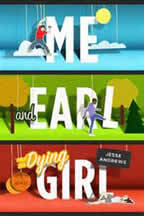 In the novel, Greg attributes his "innovatively stupid" story-telling to a fungus eating away at his brain. On reflection, he concludes that even the fungus got bored with his brain and abandoned the uninteresting little glob -- or "died from malnutrition."
In the novel, Greg attributes his "innovatively stupid" story-telling to a fungus eating away at his brain. On reflection, he concludes that even the fungus got bored with his brain and abandoned the uninteresting little glob -- or "died from malnutrition."
Perhaps, as a cancer survivor, my views are skewed. Still, clearly, I was not bored by Greg's self-analyses and self-skewerings. Jesse Andrews' YA novel and his screenplay are memorable, and, in their way, nourishing.

